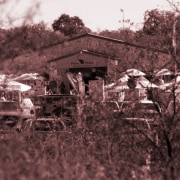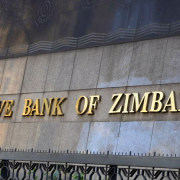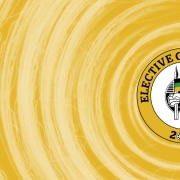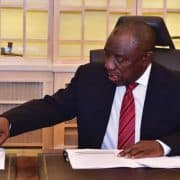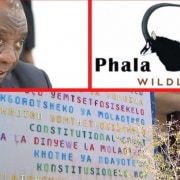|
Getting your Trinity Audio player ready...
|
By Kwazi Dlamini
President Cyril Ramaphosa, answering to questions in the National Assembly in mid-May 2023, has reiterated his commitment to clamping down on illicit financial activities and money laundering in South Africa.
His statement comes weeks after the jaw-dropping Al Jazeera documentary Gold Mafia, which exposed an extensive network of gold smuggling and money laundering in Southern Africa. The four-part docu-series implicates key individuals and senior officials in both South Africa and neighbouring Zimbabwe as being role players in smuggling gold and laundering money to the Middle East, particularly to Dubai, and other tax havens.
Ramaphosa told Parliament that his administration is taking the allegations very seriously and is “committed to the protection of the integrity of the financial system in the interest of the broader economy and ordinary citizens”.
He added that the Hawks have initiated an enquiry which is still in the early stages, to investigate the individuals and syndicates implicated in Gold Mafia.
“Investigative and regulatory authorities will act in accordance with their mandate, including in coordination with other jurisdictions where necessary to take action against those found guilty of wrongdoing,” Ramaphosa said.
The president told Parliament that he could not divulge further details, as this could jeopardise the investigation.
Widespread network of crime
The Al Jazeera Investigative Unit (AJIU) implicated individuals as well as several top South African banks who, it alleges, are colluding with the money laundering syndicates. The criminal syndicates are said to have paid monthly bribes to the bank employees to ensure that any paper trail relating to the movement of money looks legitimate and is cleared for approval.
One of the key players in the Gold Mafia scheme, Mohamed Khan – infamously known as ‘Mo Dollars’ – worked with bank officials in strategic positions to make sure the operation runs smoothly. Khan owns two locally-based financial services firms, one of which – Salt Asset Management – had its operating licence provisionally withdrawn at the end of April. Other documents and interviews obtained by AJUI revealed that dodgy transactions at these banks only took place when the bribed employees were working.
The company primarily involved in the scheme is Golf Leaf Tobacco, owned by Zimbabwean Simon Rudland, who is accused of evading taxes by selling his cigarettes on the black market. All in all, Gold Leaf managed to launder around R3-billion and move the money to Mauritius, Dubai, and Switzerland – all well-known tax havens – without paying a cent in tax.
Gold Leaf is currently under the South African Revenue Service’s radar, after the entity successfully applied for a court order to freeze the assets of Gold Leaf Tobacco and its directors, in August 2022.
Meanwhile, the implicated banks – Sasfin, Absa, and Standard Bank – have promised to conduct their own investigations into the matter, and to co-operate with authorities. Sasfin in response to Al Jazeera said that the bank has suspended the employees and will take strong action against them and those who are now former employees. Sasfin – at which, the AJIU claims, someone working in the IT department would clear all traces of illicit transactions from the system – also insists that it no longer conducts business with the companies mentioned in the exposé.
Standard Bank committed to assist in any legal investigation, saying it has zero tolerance for fraud and criminality, while Absa said it has forwarded the Al Jazeera allegations to its forensic investigative unit.
Success far from certain
Ramaphosa promised a strong stance against money laundering in the country, saying that they are working with the Financial Action Task Force to implement an action plan to strengthen the country’s efforts against money laundering and financial terrorism.
“Government will continue to combat corruption and money laundering in South Africa. It will do so both through strengthening its capability to investigate, prosecute and prevent illicit financial activities and thoroughly investigating specific allegations, such as those contained in the Al Jazeera documentary,” he concluded.
However, analysts are sceptical, fearing that South Africa’s law enforcement agencies are too “woefully inept” to get far.
Ugandan journalist and analyst Yasin Kakande told The Africa Report: “It’s laughable to think South Africa’s Hawks can prosecute sophisticated money launderers that have tentacles stretching from Johannesburg to Mauritius to Switzerland to Dubai.”
Lest we forget, Dubai authorities thoroughly outsmarted South Africa’s National Prosecuting Authority in its application to extradite Atul and Rajesh Gupta from Dubai to face charges related to state capture. It later came to light that the brothers purchased citizenship of the small Pacific tax haven of Vanuatu, which does not have an extradition treaty with South Africa – and further, that they were citizens long before Dubai let South Africa know.
The Guptas are not the only dodgy figures to have secured Vanuatuan citizenship through sheer wealth alone – several other notorious businesspeople, politicians and military leaders are said to have done the same.
So it remains to be seen whether the president will follow through with his promises, considering his government’s previous struggles to get criminals who run out of the country to come back and account for their misdeeds.

